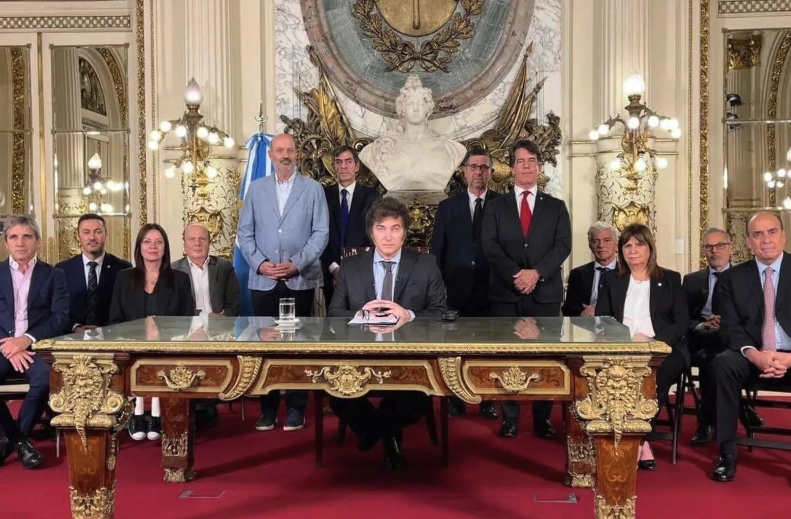On December 10, once again, Argentina entered a new political cycle with a president — Javier Milei — who has defined his administration as a “hinge of history”. In this capacity, he is inaugurating a new political stage in which he intends to make a fresh start on the assumptions on which the democratic process was based since 1983, in particular, and Argentine politics in the last century in general.
The new president has promoted two controversial initiatives based on these preceding definitions. The first, through the Decree of Necessity and Urgency (DNU 70/2023), seeks to modify or repeal more than 300 laws and has as its main purpose the deregulation of the Argentine economy. The decree, which has 366 articles, sanctions the “public emergency” in the Nation for a term of two years, until December 31, 2025, and proposes the complete repeal of the laws of rents, supply, gondolas, national purchase, and industrial promotion, among others.
The second initiative, through an omnibus law, recommends, in a text of 350 pages and 664 articles contained in those pages called “Bases and Starting Points for the Freedom of the Argentines”, very deep transformations on diverse and varied aspects such as the regulation of social protest, the reform of the electoral system, the privatization of public sector companies and the regularization of economic assets (laundering of assets), just to highlight some of them. Worth mentioning is article 654, which drives the approval of DNU 70/2023 through the approval of this law.
It is worth highlighting here some data related to the use of the Decrees of Necessity and Urgency from 1983 to date. From December 10, 1983, to December 9, 2023, 1,380 DNUs were signed in Argentina, with an average of 2.88 per month. Five former presidents made use of the resource above the average, these were Eduardo Duhalde (9.29), Néstor Kirchner (5.09), Carlos Menem (4.36), Alberto Fernández (3.71) and Fernando de la Rúa (3.04). In addition, three former presidents used DNU below the average: Raúl Alfonsín (0.34), Cristina Fernández (0.79), and Mauricio Macri (1.45). The 6 DNU signed by Adolfo Rodríguez Saá in 7 days of presidential administration (0.85 per day) between December 23 and 30, 2001 deserve a separate paragraph.
Several considerations could be made based on the above data. The first is that in the case of those presidents who have used the DNU resource above the average, their administration took place in contexts of terminal crises (or at least perceived as such). For example, economic crisis (Carlos Menem), social crisis (Fernando de la Rúa/Eduardo Duhalde/Néstor Kirchner), and health crisis (Alberto Fernández), the latter as a result of a global pandemic. The second is that in the cases of Raúl Alfonsín, Cristina Fernández (CFK) and Mauricio Macri, governmental management took place in contexts of “relative normality” (CFK) or “asymptomatic” crisis (Alfonsín/Macri).
To date, President Milei has issued seven DNUs based on a severe diagnosis of the Argentine crisis — defined, once again, as the most serious in history —, Javier Milei has proposed to the Argentine society a program of radical transformation of the economy, society, and the political system, with little support from the legislative institutions, the veto of different social organizations and conditional support from markets and public opinion: how to solve the complicated equation Part I.
At the same time, through the proposed initiatives, the president seeks to concentrate power through the delegation of powers by the legislative institutions (“La Casta”) in order to proceed to liberalize the functioning of the economy and society: how to solve this complicated equation Part II.
The experience of the 1990s brought us face to face with four alternatives for resolving similar dilemmas: Carlos Menem, Alberto Fujimori, Fernando Collor de Mello, and Abdalá Bucaram. Which of these four alternatives will be the one to solve the dilemma? Which of these four alternatives will finally define Javier Milei’s administration?
Meanwhile, Liberty Advances between necessity and urgency.
*Translated by Janaína Ruviaro da Silva from the original in Spanish.











